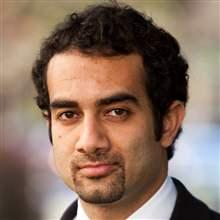|
 Shadi Hamid, Fellow, Project on U.S. Relations with the Islamic World, Center for Middle East Policy, Foreign Policy Program: Shadi Hamid, Fellow, Project on U.S. Relations with the Islamic World, Center for Middle East Policy, Foreign Policy Program:
As many of you have probably seen, ISIS spokesperson Abu Mohammed al-Adnani issued a long, rambling statement on Sunday night. There’s a lot there of interest (it’s the first explicit “order” by an ISIS leader to attack western civilians) but I think it also re-raises the question of whether ISIS was purposely trying to goad the United States into greater involvement, or miscalculated by assuming the beheadings would sour Americans. And then, intentions aside, there’s the question of whether they feel they can benefit from a heavier U.S. footprint now that it’s clearly happening. This is one of a few issues re: ISIS where I feel there’s been a lot of disagreement, and for good reasons. One side might say that ISIS, unlike al-Qaida, is focused primarily on issues of statehood, capturing and holding territory and governance, which makes it less likely to want to goad the United States. But that assumes a rational actor perspective that may not be applicable here, or, to put it differently, ISIS might have a different interpretation than we do of what they stand to benefit from. For instance, if the United States gets more involved, relies too heavily on autocratic allies, is seen working closely with Shia governments and is seen as less interested in fighting Assad, that could actually be quite useful for ISIS’s narrative, as well as their ability to maintain or increase local Sunni support. I’ve also been thinking of Michael Doran’s “Somebody’s Else’s Civil War,” where he argued that terrorist organizations aim to provoke greater powers into doing things they might not otherwise do. Whether this applies to ISIS depends on whether the same qualities that led al-Qaida to think this way apply to what is a rather different kind of organization.
|
|
 William McCants, Director, U.S. Relations with the Islamic World and Fellow, Center for Middle East Policy, Foreign Policy Program: William McCants, Director, U.S. Relations with the Islamic World and Fellow, Center for Middle East Policy, Foreign Policy Program:
I’ve been of two minds on the question of whether ISIS was trying to goad the United States into deploying large numbers of ground forces. Early on, I thought ISIS was following al-Qaida’s 9/11 playbook, which Osama bin Laden and Ayman al-Zawahri explained (before Tora Bora) as an attempt to force the United States to go all in (for the reasons you identify) or get out of the region entirely. They would have been happier with the latter outcome but argued that large-scale invasion ultimately leads to the same destination: the United States packing up and going home. (They and others were very unhappy when the United States split the difference by using airpower, special forces/CIA and tribes to roll up the Taliban.)
Another way to read the beheadings, threats of lone wolf attacks, etc. is as ways to punish the United States for action and to discourage future action. It’s called “paying the price” in jihadi works. I’m more in this camp now. But we just can’t know for sure until we see some internal ISIS memos—as you say Shadi, it’s wrong to assume they share our assumptions about what winning looks like.
Incidentally, both the “paying the price” strategy and the go-big-or-go-home strategy are both spelled out in Naji’s 2004 Management of Savagery, a book some folks say ISIS is fond of.
|
|
 Shadi Hamid: Shadi Hamid:
I’d think that ISIS leader Abu Bakr al-Baghdadi and his deputies, many of whom were officers under Saddam Hussein, have a better sense of how the United States, when challenged, can hit pretty hard. I have some trouble believing that they actually thought that beheading Americans would make the United States less willing to get involved. But that aside, I see extremist groups like ISIS and al-Qaida, for all their differences, as practitioners of “constructive instability”: their goal is to shake the regional order in some fundamental way and they had some success in doing that post-9/11. As Adnani’s statement suggests, ISIS is keen to present itself as fighting against not just the United States but what they seem to think is some sort of grand, nefarious U.S.-Shia alliance. That has considerable value in a region where anti-Americanism remains at all-time highs in several countries. But then there’s also the messianism, which distinguishes ISIS from, say, Ahrar al-Sham and perhaps even Jabhat al-Nusra, which has been more focused on fighting Assad. When Adnani says “being killed—according to their account—is a victory. This is where the secret lies. You fight a people who can never be defeated. They either gain victory or are killed,” I tend to take him at his word. I don’t doubt that, with the exception perhaps of some of the former Baathists, most in ISIS do actually believe this, and may actually welcome the prospect of dying while triggering a regional conflagration with the United States at the center. They are, after all, historical determinists, so short-term “defeats” at the hands of the United States don’t really alter the long-term trajectory.
|
|
 Daniel Byman, Senior Fellow and Director of Research, Center for Middle East Policy, Foreign Policy Program: Daniel Byman, Senior Fellow and Director of Research, Center for Middle East Policy, Foreign Policy Program:
At times we overstate the strategic coherence of groups like ISIS or even al-Qaida. Bin Laden, and now al-Zawahri, do think strategically—that is, they at times anticipate the reaction of their enemy and adjust what they do accordingly. However, often their strategies are highly unrealistic, based on flawed or even absurd foundations, or are competing. So on 9/11 Bin Laden had two logics at least:
- That the attack would in essence be a massive version of “Blackhawk Down” and thus lead the United States to flee the Middle East and
- That the attack would bring the United States into the Middle East and force the United States to reveal its true colors (and thus aid al-Qaida’s worldview) and bring U.S. soldiers to the region where they would be subject to a replay of the Soviets in Afghanistan.
So either way al-Qaida can be said to be acting strategically, but the logics are very different. For ISIS, I’m not sure they (yet) have a coherent approach toward the United States. They were very regionally and locally focused, and the war is immediate and insistent. The greater the U.S. role, of course, the more they must respond. And competition with the al-Qaida core may lead them to try to take on the West as a way of outflanking their rivals. But for now they seem to be doing better from a recruiting and fundraising front by focusing on fighting the Shiites and establishing what they claim is an Islamic State.
|
|
 Jeremy Shapiro, Fellow, Center on the United States and Europe, Project on International Order and Strategy, Foreign Policy Porgram: Jeremy Shapiro, Fellow, Center on the United States and Europe, Project on International Order and Strategy, Foreign Policy Porgram:
It seems to me that the difference of view on whether ISIS wants to deter or suck in the United States mirrors a larger discussion on how the al-Qaida and ISIS strategies differ and how those differences matter for the United States. Everybody wants jihad of course, but not everyone understands it the same way. As Martin Indyk has pointed out, perhaps the most relevant distinction is that ISIS is holding territory and attempting to govern it. Regardless of one’s ideology or plans, this is a role which tends to change the governor almost as much as the governee. It certainly means that you have something fixed to lose and, as we know, people really hate to lose what they already have. This implies that the better analogue to ISIS might be the Taliban rather than al-Qaida. They clearly had a very different view of American intervention in Afghanistan and paid a very different price in the event. Of course, there are many different logics and I don’t think any of us at this point can get into the head of ISIS leadership or even understand it’s probably incoherent and contradictory decision-making structure. But we can say that ISIS’s strategy of governing will tend to produce a certain kind of organization regardless of its initial ideology.
|
|
 Shadi Hamid: Shadi Hamid:
I was going through some articles and found this anecdote of Obama pondering what he’d do if he was an advisor to ISIS quite interesting in the context of this discussion:
If he had been “an adviser to ISIS,” Mr. Obama added, he would not have killed the hostages but released them and pinned notes on their chests saying, “Stay out of here; this is none of your business.” Such a move, he speculated, might have undercut support for military intervention.
This struck me as a bit naïve, showing Obama’s readiness, which might be laudable in other contexts, to apply a straightforward rational actor lens that doesn’t necessarily apply here. I also worry he underestimates the ways in which U.S. involvement, if not tied to a broader, long-term strategy in Syria, could prove less beneficial to our stated aims than we’d all like to think.
|
|
 Charles Lister, Visiting Fellow, Brookings Doha Center, Foreign Policy Program: Charles Lister, Visiting Fellow, Brookings Doha Center, Foreign Policy Program:
Through 2014 (and particularly post-June), ISIS has more or less abided by a step-by-step approach of encouraging its enemies (local, regional and international) to take steps down a long slippery slope—whereby ISIS’ own apparent unpredictable advances have induced a short-termist reactiveness amongst its opponents, which it has been keen to present as a process towards adopting unplanned escalation and the risky investment of existentially valuable resources. In this regard, the beheading of hostages was at least in part intended to exploit what ISIS perceives as a particular reluctance within U.S. and EU circles to become embroiled in another conflict in the Middle East, but the inevitability of some extent of action when its citizens are killed in such circumstances abroad. Taken in isolation, ISIS has at least partially succeeded here.
In this respect, regarding ISIS not being interested in finding itself in direct confrontation with the United States is nonetheless still very much accurate, I believe. However, while the beheading of hostages began after U.S. strikes, it also began after ISIS had established sufficient territorial control and governance over populations to feel confident enough to proclaim the Caliphate. In many ways, this mirrors ISIS’ well-established (particularly late-2009 onwards) precedent for carrying out, on a macro-level, a very methodical and multi-staged strategy of recovery, growth, expansion and consolidation. The conscious devolution from insurgent to terrorist structures, with a principal axis in Mosul in late-2009 and early 2010 initiated this process, which subsequently included operational re-expansion through 2010–2012, and then Operation Breaking the Walls (July 2012–July 2013), Operation Soldiers Harvest (July 2013–July 2014) and finally now, simply the Caliphate (July 2014–present). As has been noted, all of this has primarily been dominated by a local/regional focus, aimed at engendering the conditions necessary for territorial control to be expanded. But we’re in a different phase now. Whether it’s realistic or not, the “Islamic State” now perceives itself a totally different animal than before.
As such, we should not disregard the intense millenarianism expounded within ISIS’ foundational ideology, which continues intensely to this day. Adnani’s recent statement made clear ISIS’ intention to march on Damascus ((as per prophesies, including the Umayyad Mosque’s Al-Manara al-Bayda (White Minaret) being the site of Jesus’ return to earth)) and the recent ISIS offensive north of Aleppo succeeded in capturing the extremely symbolic town of Dabiq (site of the final battle before the end of days). This is to name only two recent such examples, which hark very much back to Zarqawi’s original thinking. Within such a mindset, it hardly matters that the United States (and its coalition) is militarily superior…
Another point is the references to the so-called “Khorasan Group”—which so far as I’ve personally been aware over the past six months, is not an independent al-Qaida unit so much as a newly established wing within Jabhat al-Nusra’s senior structure. Both Mohsen al-Fadhli and also Abd al-Mohsen al-Sharikh (Sanafi al-Nasr) have played a role in Jabhat al-Nusra’s top-level dynamics in recent months, most notably in cementing relations with the Abdullah Azzam Brigades in Lebanon and the partial restructuring of Nusra’s senior leadership. I think it’s misleading to refer to this “Khorasan Group” as independent of Nusra altogether—operationally they have different immediate objectives, but long-term, they’re very much in sync. After all, Jabhat al-Nusra is in a serious state of flux right now, and has been for several months, with the direction of evolution being very much towards an old-style al-Qaida organisation, with eyes on both a near and far enemy. This will pose significant internal challenges looking forward, however.
Finally, it’s worth keeping an eye on intra-rebel dynamics inside Syria. General Dempsey’s remarks last week were deeply damaging for U.S. relations inside the “moderate” rebel camp. By suggesting that U.S.-led strikes and enhanced assistance (including training) to vetted rebels would be predicated on “deferring” the fight against Assad, Dempsey has significantly dented sustainable support for U.S.-aligned objectives in Syria. The most vehemently pro-U.S. front, the Syria Revolutionaries’ Front , has voiced subtle digs at the United States since, and the high-profile first recipient of American TOW anti-tank missiles, Harakat Hazm, has officially announced its condemnation of U.S. and Arab state intervention in Syria. These condemnatory statements have been followed by similar ones signed by at least 11 other groups, including several who receive public Western military support, like Jaish al-Mujahideen and Forqat 13. As I’m sure will be agreed here, air and cruise missile strikes will never be sufficient in “rolling back” ISIS or al-Qaida in Syria (or Iraq) – local actors are invaluable. But we may be slowly losing them in Syria, if “we’re” not careful.
|
 Shadi Hamid, Fellow, Project on U.S. Relations with the Islamic World, Center for Middle East Policy, Foreign Policy Program:
Shadi Hamid, Fellow, Project on U.S. Relations with the Islamic World, Center for Middle East Policy, Foreign Policy Program: William McCants, Director, U.S. Relations with the Islamic World and Fellow, Center for Middle East Policy, Foreign Policy Program:
William McCants, Director, U.S. Relations with the Islamic World and Fellow, Center for Middle East Policy, Foreign Policy Program: Daniel Byman, Senior Fellow and Director of Research, Center for Middle East Policy, Foreign Policy Program:
Daniel Byman, Senior Fellow and Director of Research, Center for Middle East Policy, Foreign Policy Program: Jeremy Shapiro, Fellow, Center on the United States and Europe, Project on International Order and Strategy, Foreign Policy Porgram:
Jeremy Shapiro, Fellow, Center on the United States and Europe, Project on International Order and Strategy, Foreign Policy Porgram: Charles Lister, Visiting Fellow, Brookings Doha Center, Foreign Policy Program:
Charles Lister, Visiting Fellow, Brookings Doha Center, Foreign Policy Program:


Commentary
Around the Halls: What is ISIS’ Strategy?
September 24, 2014